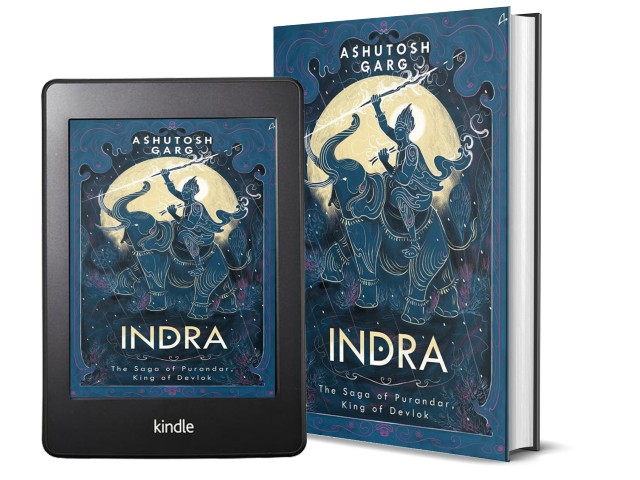Indra, the king of Gods, just a mention of him brings a lot of different emotions altogether. Those who have proper knowledge of ancient Bharatiya (that is Indian) literature that Indra is a post. Whoever is throned as the King of Devas, known as Indra. The current Indra is – Purandar. Sanskrit hymes like the following used in regular rituals are quite clear about that.
स्वस्ति न इन्द्रो वृद्धश्रवाः ।
स्वस्ति नः पूषा विश्ववेदाः ।
स्वस्ति नस्तार्क्ष्यो अरिष्टनेमिः ।
स्वस्ति नो बृहस्पतिर्दधातु ॥
ॐ शान्तिः शान्तिः शान्तिः ॥Meaning (very rough translation):
May Indra (of Vedas) of great Wisdom and Glory grant us Well-Being (by bestowing wisdom), May Pushan (The Sun God, The Nourisher) of great Knowledge grant us Well-Being (by nourishing us and granting knowledge), May Tarksya (A Mythical Bird) of great Protective Power ( a thunderbolt to misfortunes ) grant us Well-Being (by protecting us from misfortunes), (And) May Brihaspati (The Guru of the Devas) grant us Well-Being,…
Indra, Agni and Varun (or Varuna) are amongst important gods and are found mentioned at length in Vedas.
इन्द्र श्रेष्ठानि द्रविणानी धेहि चितिं दक्षस्य सुभागत्वमस्मे।
पोषं रयीणामरिष्टिं तनूनां स्वाद् मानं वाच: सुदिनत्वमह्वाम् ।।
While most of the readers know about Indra through his unthoughtful acts and consider him as an insecure king, always worried about his throne. As soon as he catch a wind of someone’s good deeds and popularities rising to an alarm-ic level for him, he start his devious acts to turn the person down. This way he keep nullifying his possible challengers. All the posts, even the throne of King of Devas, has that effect on the beholder. The person sitting on it knew that as he/she dethroned someone else, someday he/she is also going to have the same fate. And, there is nothing “shocking” in that. It is the rule of Karma that everyone has to follow.
So, does Indra only an insecure ruler who enjoys the pleasures of Swarga (the heaven) and does nothing else? Doesn’t he possess any other worthy qualities at all?
Well, obviously he has to have another side proving him worthy of the throne!
| Book Title | : | Indra: The Saga of Purandar |
| Author | : | Ashutosh Garg |
| # of Pages | : | 324 (Paperback) 1350 KB; 241 (Kindle EBook) |
| # of Chapters | : | 33 |
| Purchase Link(s) | : |
|
Recently, we got a chance to read Indra – a book by Ashutosh Garg. We explored it with a hope to have a chronological account of the incidents from our ancient literature. Here I present my views and reviews for this book on behalf of Team ThinkerViews. As always, the review is unbiased and uninfluenced by all means.
This Is Here In For You
Cover Page:
Being a gateway to the virtual world explored within, the book cover plays a vital role in making the first impression of the book. And thus, it is often responsible for many purchase and/or book-pickup decisions.

Indra: The Saga of Purandar By Ashutosh Garg | Book Cover
As you can see the cover page of Indra is not very attractive. While it is thoughtful to have a dark background and illustration of thunder, it doesn’t seem to be able to catch your attention in a compendium of books.
The Book And My Thoughts About It:
Usually we talk about the storyline and our views and reviews for the book in two distinguished segment. This book, however, is a collection of stories referring Indra in a random manner, we are merging both the segments here.
First thing first, don’t expect this book to be a biographical tale of Purandar’s life. The author himself makes it clear at the very beginning:
Moreover, I do not wish to give a biographical account of Purandar’s life.
The incidents mentioned are not in a chronological manner. As per my opinion that must have been maintained. Also, the last chapter that work as a conclusion, (as the author adds last notes there), explores the incidents happened quite earlier in Purandar’s regime as Indra. A major part of the book explores the incidents happened later in the timeline, after the one referred in it (the last chapter).
One of the good things about this book is, it introduces Purandar, his nature, his family and his importance quite well.
Although, Purandar usually rides on his gigantic white elephant, Airavat, he enjoys the privilege or at least that is what he thinks, of taking anyone for a ride! Purandar also has a white horse named Uchchaishrava and Maatali is the name of his charioteer.
– – – – – – – – – – – – – – – – – – – –
His consort Shachi, by virtue of being Indra’s wife, is better known as Indrani. They have a son, Jayant and two daughters, Jayanti and Devasena.
– – – – – – – – – –
Almost 250 hymns are dedicated to Indra in the Rigveda.
The first chapter starts with logically obvious incident, the coronation of Purandar as Indra. You come to know about his characteristics in unbiased manner. The author doesn’t waste much time in explanations. His exploraiton of incidents is sufficient to see various sides of Purandar’s persona. For example:
“Pranaam!” Purandar bowed his head before his mother.
At the same time, he got advise from an elderly respected figure on the very same page:
Such sharp impedance will do you more harm than good.
And author says:
Purandar was not arrogant by nature. It was the seat of Indra, which cast its spell on incumbents.
Haven’t we witnessed such effects on many popular people’s persona? The author says bluntly (at more than one places in the book, in a slidghtly different manner):
Absolute power had corrupted him absolutely!
So, if you read books with an intent to learn something important, this book has many practical advices to follow. Here are some more important life-lessons:
Any service, howsoever tiny and insignificant it may appear, rendered with love, devotion and sincerity has the same value as any other work of gigantic proportions done with love and devotion.”
Thus, I have concluded that desires are endless and the more one tries to gratify them, the more they are inflamed.
Lust drives a man crazy and makes him commit the most unacceptable follies.
Just like a house becomes a home only when people live in it, so is the case with the court of a king. A court becomes influential and impressive, not by illusions and ostentations, but by the kind of people who sit there and preside over it.”
Kashyap in a compassionate tone, “but one has to deal with personal loss…
And, they appear through various characters and lessons they have learnt (or their stories conveyed), be it Purandar, Ahalya, Yayati, Nahush or someone else.
The good thing about ancient Indian literature is, it conveys information in entertained manner. That makes the reader glued to it. Of course, when re-telling happens, it is the job of the storyteller to keep this quotient intact. In this book, the author introduces various characters, elements and other stuff in interesting manner. Here are some such simple yet interesting lines.
Sage Artharvan, considered the conceiver of the mantras of the Atharva Veda, had a brilliant son named Dadhichi.
Madhu Vidya could help one attain immortality.
A famous sage named Twasthaa had a daughter called Prabha. She had two sons born from Vivasvan. These two children, named Ashwini Kumaras, grew up as twin-horsemen mentioned in the Rig Veda, for they had human figures with the heads of horses.
When you have a good command over the language and your thoughts are clear, you don’t need too many/fancy words to convey your thoughts.
… discretion is the better part of valour.
… good conduct was the basis of everything in a man’s life.
Most of the people consider, a King as a lucky person, who enjoys all the material happiness without doing much work. On the contrary, there is Raj-Dharma, that binds the king to follow very tight rules and serve the people. The throne has invisible thorns also. Of course, it applies to the one who follows the Dharma. Here are some interesting lines from the book that explores the essence of the Rajdharma quite effectively.
He said, “The guilt of being a childless king has been gnawing at me day and night. Despite all possible efforts, I have not been able to do anything about it. I have failed you as a husband. More than that, I have failed my kingdom, my people and my race for not having given a successor, which was their right!”
Yuvanashwa prostrated at Bhrigu’s feet. Here was a king who had everything but had renounced it because he failed to give his kingdom an heir. In front of him was a sage, who had nothing of his own, yet he could give to the king all that he wished for!
I found some modern words/proverbs/sayings etc. in the book. While they effectively adds contemporariness to the writing. It also feels like out of context in terms of timeline.
As the story represents ancient times, some readers may not digest it well.
Having robbed Prahlaad of all his virtues, Purandar was on cloud nine! As they say, absolute power corrupts absolutely.
His nature remained the same—a case of old wine in a new bottle!
Of course, we can give the author a benefit as Indra is the god of rain and thunder “cloud nine” can fit in that context. Same way, he love drinking Soma, so “old wine, new bottle” etymology also is partially in context.
Emotions and intelligence often go hand-in-hand. Sometimes “cunningness” also accompany them. From many ancient Indian tales we learnt that the Daityas often go beyond boundaries in doing sacrifices and penance in order to get the boon they wanted.
More often than not, it is immortality. As the Gods are bound to offer boons when they are prayed with intensity, they often need to find a way to deceive the recipient to not to let him/her be the absolute master of the destiny. Without the fear of death, one can do some bad (and good too!) that can prove to be fatal for the universe.
In this interesting example taken from the book, Narakasur uses his intelligence in getting “immortality” as a boon, indirectly.
If I have to die, let it happen at the hands of my mother!
Narakasur was extremely happy. It was the equal of attaining immortality as no mother would ever kill her own child!
The author is good at exploring attributes of a characters using both direct and indirect methods. Here are some character defining lines about Purandar.
Purandar, one should be magnanimous enough to accept one’s fault.
It is uncomely of you to run away from an adversary, especially an daitya. It will only mar your dignity further.
5oon, the lustful king of devlok started prowling around in search of beautiful women.
Krishna could not believe his ears. What an ungrateful wretch Purandar is! Krishna thought to himself. It was now more a question of prestige for the Lord than of right or wrong.
But it was not in Purandar’s nature to let things happen smoothly. He liked playing tricks, even with his son!
And, the author is not exploring only vulnerable side of Purandar. He also has infused lines like the following (at many places):
Everybody stared at an irate Indra standing with the deadly Vajra in his right hand. He was the king of the devas, but he seemed like the God of death, Yamaraj.
The book could have been proofread better. I found some sentences which could have been rectified / constructed better. For example:
Look, I am an daitya!
Owing to the few drops of amrita that I had cconsumed,
Lord Shiva’s flame can do you know harm!
Nothing! You need do nothing.
The quotes mentioned above must have given you a fair idea about the book content and its quality. Of course, we cannot talk about all the stories, to make this review as spoiler free as possible. I like the book for being a collection of stories about Purandar – the current Indra. I guess some of them would be new to read for the readers, especially those who are much about reading literature set up in modern times, or from different continents.
The narration style of the book (despite some chronological flaws, which I don’t think, a regular reader will mind much) is simple and the author seems have tried consciously to make it an easy read.
The good thing is, the stories are presented in almost original versions. Despite being a book on Indra, it doesn’t try to make him the protagonist or antagonist. Indra is represented as Indra. And, that is a challenge for any author, to write without biases. The author is in complete control of himself, in that sense.
Summary:
On the whole, a book well written with some good linguistic attributes. The inclusion of some lesser known stories about Purandar adds to the positive. If the stories are weaved in a proper chronology/timeline it would have been better. You may like to to read it, especially, if you love to explore tales rooted in the ancient Indian literature.
ThinkerViews Rating:
Around 7 stars out of 10.
Quick Purchase Links:
- Buy - Indra: The Saga of Purandar by Ashutosh Garg - Paperback - Amazon IN
- Buy - Indra: The Saga of Purandar by Ashutosh Garg - Kindle EBook - Amazon IN
- Buy - Indra: The Saga of Purandar by Ashutosh Garg - Paperback - Amazon US
- Buy - Indra: The Saga of Purandar by Ashutosh Garg - Kindle EBook - Amazon US
Over To You:
If you already have read the book do share your remarks and thoughts via comments below. Does this review help you in making your decision to buy or read the book? Do not forget to share this article with your friends over various social networks. Please follow/subscribe us on various Social networks like Twitter, Facebook, YouTube, Spotify, Amazon Prime Music, Audible, and others. And yes, you may like to subscribe to our RSS feeds to get latest updates for the site to land right in your mail box.
 ThinkerViews – Views And Reviews Personal views and reviews for books, magazines, tv serials, movies, websites, technical stuff and more.
ThinkerViews – Views And Reviews Personal views and reviews for books, magazines, tv serials, movies, websites, technical stuff and more.



